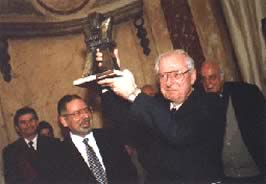 Ambassador Eugeniusz Noworyta with the sculpture "Homage to Raoul Wallenberg".
Ambassador Eugeniusz Noworyta with the sculpture "Homage to Raoul Wallenberg".Within the educational program ‘Diplomacy and the Holocaust’ and with the presence of more than 100 people the International Raoul Wallenberg Foundation (IRWF) paid tribute to the Second World War hero, Jan Karski, the first reliable eyewitness who informed the allies about the Holocaust. Karski, a Catholic raised by Jesuits, used to be a member of the Polish underground. As a courier he went through Europe permanently risking his life. When he heard about the plans that the Third Reich had for the Jewish people, he decided to infiltrate the Warsaw ghetto as well as many concentration camps. Impressed by what he saw, he decided to tell the world what was going on, long before the “Final Solution” was publicly known, and that was being carried out with macabre discipline by Himmler, Heydrich and Eichmann, among others.
The ceremony took place on June 20 at the embassy of Poland in Buenos Aires. Writer Marcos Aguinis, Holocaust survivor Jack Fuchs, Father Horacio Moreno and the ambassador of Sweden, Peter Landelius made a speech.
The ambassador of Poland, Eugeniusz Noworyta, received the sculpture “Homage to Raoul Wallenberg”, an exclusive piece of the IRWF made by the Argentine artist Norma D’Ippolito.
During the ceremony Karski’s testimony to the filmmaker Claude Lanzmann for the movie ‘SHOA’ was projected.
Among the people present was the Chief Rabbi Salomón Ben Hamú, survivors of the Holocaust, as well as ambassadors and numerous diplomatic delegations and communities.
The adhesions included greetings from Vaclav Havel, President of the Czech Republic; Cardinal Angelo Sodano, Vatican’s State Secretary; Kofi Annan, UN Secretary General; Anibal Ibarra, Mayor of the city of Buenos Aires and Andrés Delich, the Argentine Secretary of Education.
In his letter, President Havel, honorary member of the IRWF points out:
‘Allow me join you in remembering Jan Karski. The memory of the victims of the Holocaust and all those who tried to prevent its horrors, reminds us that every expression of hatred towards minorities tends to be the beginning of an attack on the fundamentals of basic humanity itself.’
Minister Delich wrote:
‘The stories of life of Jan Karski and Jack Fuchs allow us to remember not only tragedy but also heroism and dignity. This memory must turn itself into a daily commitment and a critic to prejudices, stereotypes and fallacies. To remember means to understand the present in the light of what has happened and thus, to prevent and to prepare us for the future.’
Dr. Ibarra, Mayor of the city of Buenos Aires, pointed out in his adhesion that
”We are aware of the great historical and educational importance in paying tribute and remembering those who resisted and condemned the terrible crimes committed by Nazism, as a way of preventing its repetition in the present and in the future.”
